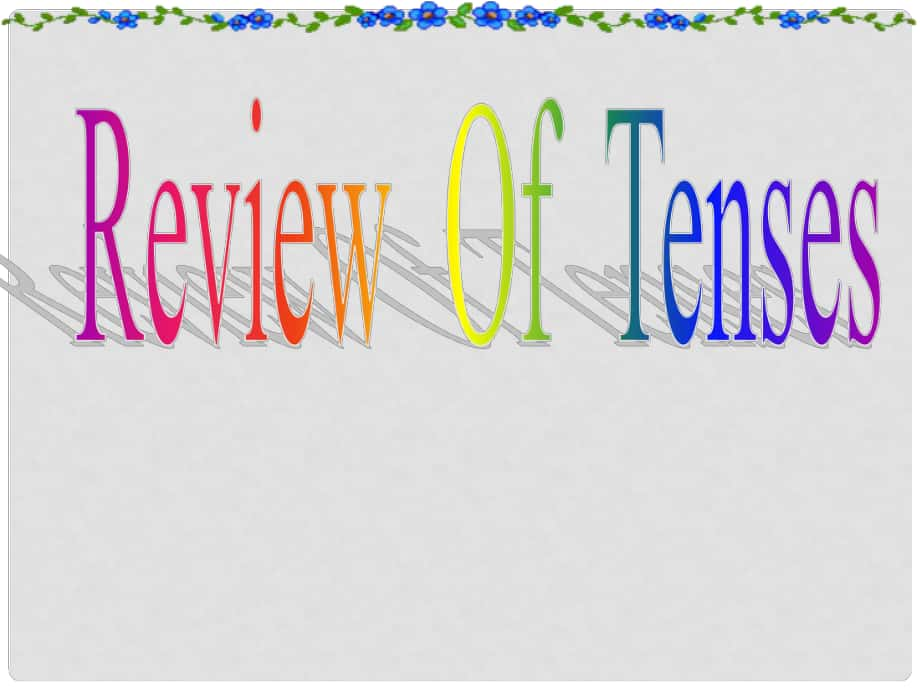《中考英語33個(gè)模塊總復(fù)習(xí) 動(dòng)詞時(shí)態(tài)課件1》由會(huì)員分享�,可在線閱讀,更多相關(guān)《中考英語33個(gè)模塊總復(fù)習(xí) 動(dòng)詞時(shí)態(tài)課件1(36頁(yè)珍藏版)》請(qǐng)?jiān)谘b配圖網(wǎng)上搜索�����。
1�、Lily Lucy What a fine day today! Look. 現(xiàn)在進(jìn)行時(shí)現(xiàn)在進(jìn)行時(shí): Present Progressive概念概念: 表示現(xiàn)在正在發(fā)生的動(dòng)作表示現(xiàn)在正在發(fā)生的動(dòng)作結(jié)構(gòu)結(jié)構(gòu): be (is, am, are) + doing標(biāo)志語:標(biāo)志語: Look! 、 Listen! �、now一般在動(dòng)詞原形后一般在動(dòng)詞原形后+ing以不發(fā)音的以不發(fā)音的e結(jié)尾結(jié)尾的,去的�����,去e�����,+ing重讀閉音節(jié)以一個(gè)重讀閉音節(jié)以一個(gè)輔音字母結(jié)尾的�����,輔音字母結(jié)尾的�,雙寫這一字母雙寫這一字母+ing動(dòng)詞動(dòng)詞-ing形式的構(gòu)成:形式的構(gòu)成:writingtakinggettingrunnings
2、wimminggoinggoaskwritetakegetrunswimasking1.The twins _(wash) the clothes now.2.Look! He _ (play) basketball over there.3.Listen! _ Sally _(sing)?are washingis playingIssingingHow often do you ? (once a week, twice, never)I have a friend. His / Her name is.He / She plays. 一般現(xiàn)在時(shí)一般現(xiàn)在時(shí): Present Simple概
3�、念概念: 表示習(xí)慣�����、經(jīng)常性的動(dòng)作表示習(xí)慣、經(jīng)常性的動(dòng)作結(jié)構(gòu)結(jié)構(gòu): do�、 does標(biāo)志語:標(biāo)志語:usually、often�、never、 sometimes�、once a week、 twice a month�、every year1.The twins _(wash) the clothes every day.2.Sometimes he _ (play) basketball over there.3.How often _ Sally _(sing)?washplaysdoessing- What did you do last Sunday morning? - I went to
4、.morningwentafternoonvisitednightLast Sunday morning, my friend. In the afternoon, he/she. And at night, he/shemorningwentafternoonvisitednight一般過去時(shí)一般過去時(shí): Past Simple概念概念: 表示過去發(fā)生的動(dòng)作表示過去發(fā)生的動(dòng)作結(jié)構(gòu)結(jié)構(gòu): did標(biāo)志語:標(biāo)志語:yesterday�����、. ago�����、 in 1992�����、 last week/month動(dòng)詞動(dòng)詞-ed形式的構(gòu)成:形式的構(gòu)成:在動(dòng)詞后加在動(dòng)詞后加-ed以字母以字母e 結(jié)尾的動(dòng)結(jié)尾的動(dòng)詞�,只詞
5�����、�,只+d“ 輔音字母輔音字母+y ” �,變變y 為為i, 再再+ed重讀閉音節(jié)以一個(gè)重讀閉音節(jié)以一個(gè)輔音字母結(jié)尾的,輔音字母結(jié)尾的�,雙寫雙寫+edwantanswermovediecarrycrystopplanwantedmoveddiedcarriedcriedstoppedplannedansweredgotdranktookwentswamatecutwerehaddidcamesaidsawputgettakegoswimeatdrinkarehavedocomecutputsaysee1.The twins _(wash) the clothes yesterday.2.The d
6、ay before yesterday he _ (play) basketball over there.3._ Sally _(sing) two hours ago?washedplayedDidsing- Have you packed yet? - Yes, I have packed . No, I havent pack the towelspack the cameraXwater the plants現(xiàn)在完成時(shí)現(xiàn)在完成時(shí): Present Perfect概念概念: 表示已經(jīng)發(fā)生的動(dòng)作表示已經(jīng)發(fā)生的動(dòng)作結(jié)構(gòu)結(jié)構(gòu): has done�、 have done標(biāo)志語:標(biāo)志語:alrea
7、dy�����、 yet�、ever、 never�、since、for�����、getgoeataredocutsaygot gottenwent goneate eatencut cutwere beendid donesaid saidtakeswimdrinkhavecomeputseetook takenswam swumdrank drunkput puthad hadcame comesaw seen1.The twins _(wash) the clothes for an hour.2.He _ (play) basketball since three years ago.3.How long
8�����、_ Sally _(sing) yet?have washedhas playedhassung過去完成時(shí)過去完成時(shí): Past Perfect概念概念: 表示將要發(fā)生的動(dòng)作表示將要發(fā)生的動(dòng)作結(jié)構(gòu)結(jié)構(gòu): had done標(biāo)志語:標(biāo)志語:by the time, 或主句為或主句為 一般過去時(shí)的賓語從句中一般過去時(shí)的賓語從句中過去進(jìn)行時(shí)過去進(jìn)行時(shí): Past Progressive概念概念: 表示過去正在發(fā)生的動(dòng)作表示過去正在發(fā)生的動(dòng)作結(jié)構(gòu)結(jié)構(gòu): be (was,were) + doing標(biāo)志語:標(biāo)志語:at 8:00 yesterday �、 when、 while�����、一般將來時(shí)一般將來時(shí): Fut
9�、ure Simple概念概念: 表示將要發(fā)生的動(dòng)作表示將要發(fā)生的動(dòng)作結(jié)構(gòu)結(jié)構(gòu): will do�����、 shall do�����、 be (is�、am、are) going to do標(biāo)志語:標(biāo)志語:tomorrow�、in.、next過去將來時(shí)過去將來時(shí): Past Future Simple概念概念: 表示過去將要發(fā)生的動(dòng)作表示過去將要發(fā)生的動(dòng)作結(jié)構(gòu)結(jié)構(gòu): would do be (was�、were) going to do標(biāo)志語:標(biāo)志語:常用于主句是一般過去常用于主句是一般過去 時(shí)的賓語從句中時(shí)的賓語從句中1.2.3.4.5.get, got, will getwas readingis knockin
10、gdoes surfhave been6.7.8.9.10.have heardwentwould putDid happenwas doing11.12.13.14.15.doesnt rain, will goDo playwont callhas worked walked, had startediscomesis drawingmoveddidnt haveusedhasstudieswill visitComposition: I(你的過去�、現(xiàn)在和將來)(你的過去、現(xiàn)在和將來) Write an article about yourself, tell us your past�����、your present and your future.
 中考英語33個(gè)模塊總復(fù)習(xí) 動(dòng)詞時(shí)態(tài)課件1
中考英語33個(gè)模塊總復(fù)習(xí) 動(dòng)詞時(shí)態(tài)課件1

